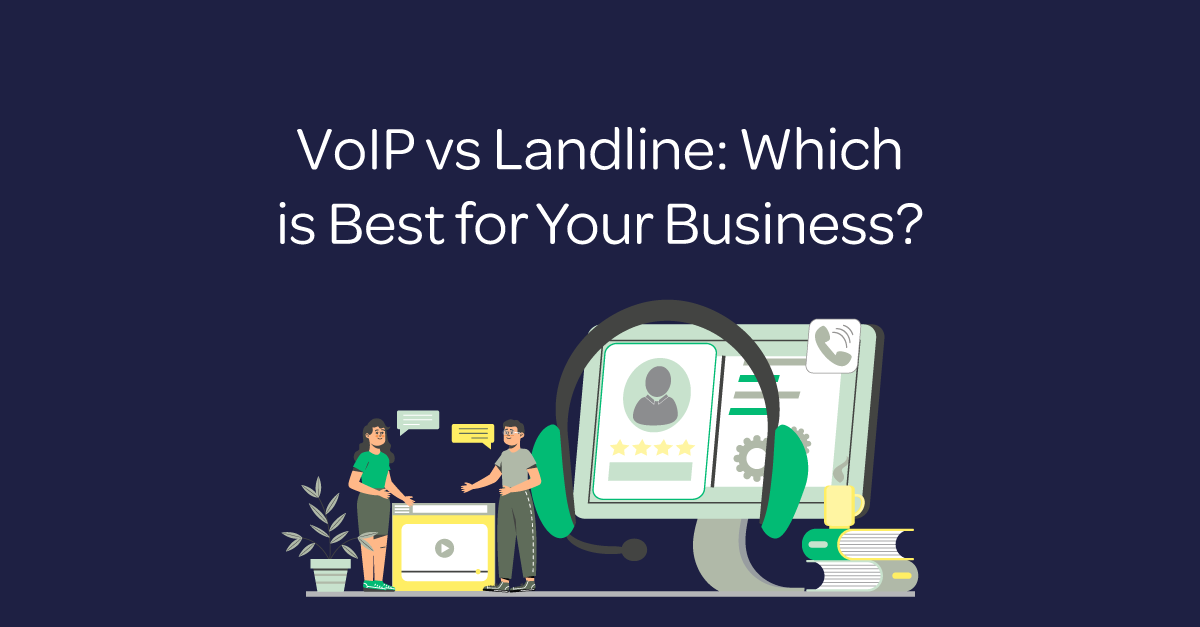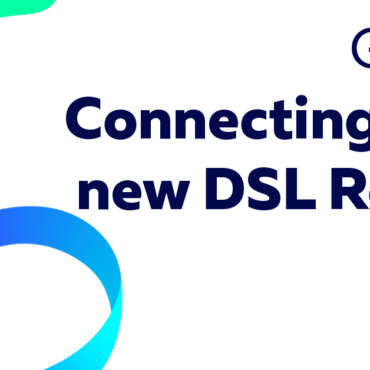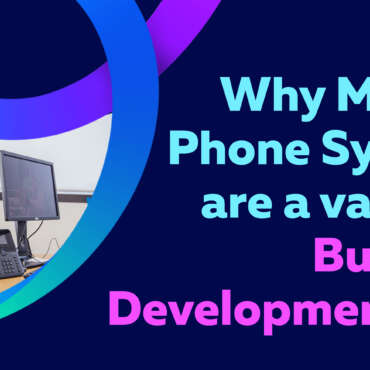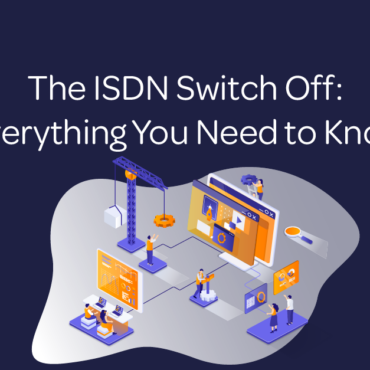Technology is a huge part of today’s business world. It has changed the way businesses collaborate, market their products, and much more.
Naturally, technology has also impacted the way employees communicate with customers. In the past, this was largely done through traditional landline phones. However, since the explosion of the internet, VoIP phone systems have become a part of every industry.
What is VoIP?
VoIP stands for Voice Over Internet Protocol – a technology that allows businesses to make and receive calls over the internet.
The way it works is very simple:
Step 1: A business adds the VoIP software and app to their business devices (computers, laptops, smartphones, tablets)
Step 2: They connect these devices to the internet
Step 3: Employees put on their headsets
Step 4: Everything is ready to go!
This technology has been around since the mid-90s, but it’s only over recent years that it’s really taken off in the modern workplace.
34% of SMEs now use a VoIP phone system – which is huge. Moving into the future, this number is going to continue to grow, as landlines become extinct.
The Benefits of VoIP
With that said, we can now take a look at the benefits of VoIP for your business.
Easy setup
First of all, VoIP phone systems are super easy to set up.
Think about your smartphone for a second. When you go to the app store and download an app (e.g., Facebook), it’s on your smartphone and ready to use within seconds, right?
This is essentially how VoIP works. It’s a software/app that you download to your business devices – no physical hardware is involved.
On the other hand, with a traditional landline system, you’re looking at a long and tiring setup (and maintenance). In the current business environment, there’s no time for this.
Mobility (employees can work from home)
Unless you’ve been living under a rock for the past couple of years, you’ll be aware that working from home has become the new norm. Now, big corporations, such as Apple and Amazon, are allowing their employees to work remotely. The same applies to smaller businesses and startups, too.
One of the main reasons that employees can work remotely is because of VoIP phone systems.
At home (or other locations), they can access their phone systems using a laptop or smartphone and still seamlessly communicate with customers.
So, if you’re a business owner who’s planning on allowing your team to work remotely during the week, you will need a VoIP system. Otherwise, remote communication will be impossible.
Cheaper
Due to the fact that they work over the internet and require no hardware installation, VoIP phone systems are a lot cheaper than landline alternatives. In an age where businesses need to save as much money as possible, this is important.
Scalability
If you’re like most other businesses, you will have the ambition to grow and scale upwards as you move into the future. New employees, new office premises, new everything. With a VoIP system, you’ll be able to scale up with very minimal fuss.
VoIP phone systems come with a ton of impressive features that are perfect for modern communication. Some of the best features include:
When it comes to choosing a new phone system, many business owners worry about migrating their existing data over. However, a VoIP system enables fast CRM integration.
For example, if you currently have all of your customer data (such as phone numbers and email addresses) stored on Salesforce, you’ll be able to transfer all of it over to your VoIP system within minutes.
As a business owner, you need to focus on improving the performance levels of your phone employees. However, if you’re busy, you probably don’t have much time to listen in on them and give feedback.
With VoIP, though, you will be able to record customer calls so that you can listen back to them and provide your team members with feedback. For example, you might discover that one particular phone agent is being overly pushy with customers on the phone.
In addition to this, you can also use call analytics. Call analytics will provide you with tons of useful insight, such as how often your phone employees are spending talking to customers. If one particular employee is experiencing persistent dropped calls, you’ll know that you need to step in.
When customers and clients call your business, they want to be handled in a professional and friendly manner. This is why you should use your VoIP system’s voice assistant feature. This will ensure that your customers feel welcome and are directed to the correct department. Plus, they will also remain informed how long they will be waiting before an employee answers the phone (therefore reducing the number of dropped calls you get).
- Instant messaging for employees
VoIP systems aren’t exclusively for voice communication – they’re also for built for instant messaging.
Your employees will be able to instant message each other using their computer and smartphone devices, raising your professionalism and collaboration efforts.
- Call forwarding and holding
When a customer is speaking to an employee of yours and the employee realises that they can’t solve their problem, it’s important to take quick action. Usually, this will involve forwarding the call to a specialist employee or placing the customer on hold until a solution is found.
VoIP phones enable easy call forwarding and holding, meaning you can keep your customers happy!
- Active statuses
Lastly, your employees will be able to set active statuses on their devices.
For example, if one of your employees has gone for a break, they will be able to set their status to ‘Away’. This will ensure that calls are forwarded to other employees – convenient, right?
Future-proof
The global business environment changes every year. With the constant introduction of new technologies and strategies, the key to survival is future-proofing your business. Otherwise, you’ll fall behind your competitors – and eventually lose your place in the market.
One of the best ways to future-proof your business is by having a VoIP phone system. This is especially true if you have a large number of customer service representatives.
VoIP is projected to be the standard for businesses for the foreseeable future. Therefore, it’s important that you get involved now before it’s too late.
BT had planned to switch off their ISDN lines in 2025 – this has now been pushed back to 2027. Basically, this is like an ice age for traditional landline business phones – they’re going to go extinct. The deadline is fast-approaching – this is why so many small, medium, and large-size businesses are migrating to VoIP early.
The Cons of VoIP
Now that we’ve covered the benefits of VoIP, let’s now address some of the cons (after all, no technology is perfect).
Internet-dependant
Without a reliable internet connection, a VoIP system can’t work.
So, if you don’t have one already, you will need to find a reliable broadband provider. This way, you and your team will be able to work over a VoIP system in your office with no connection drops or other interruptions.
Of course, if some of your employees are working remotely from home, they must have a strong internet connection. Prior to allowing them to work from home, you must ask them to provide proof that their internet connection is reliable. Otherwise, they will struggle to communicate with customers remotely and will potentially lose out on sales.
Potential software issues can happen
From time to time, software issues can occasionally occur on VoIP systems. Don’t panic, though – they’re easily solvable.
Whoever your VoIP provider is should have remote software engineers on-hand who will be able to have your system back up and running in no time. In fact, most VoIP companies provide 24/7 maintenance, which should give you peace of mind.
Training required
Lastly, VoIP phones require a little bit of training to get used to them. Typically, after an hour-long demonstration, employees will be ready to go.
Training is particularly important if you have employees who aren’t tech-savvy. However, VoIP systems are generally straight-forward, meaning anyone can get the hang of them.
No location tracking
In the case of emergency, traditional landlines offer location tracking when you call 911 (which allows first responders to find you instantly). Because they’re internet-based, VoIP phones don’t offer location tracking.
Benefits of Landlines
Now that you’re a VoIP expert, let’s take a look at landlines.
Easy physical switch off
When you go on a dinner break or the end of your shift arrives, landline phones are easy to switch off, as it only requires the click of a button.
Tried and trusted for decades
Landline business phones have been around for decades with good reason: they work.
For years, businesses have been able to rely on them when it comes to communicating with customers and clients. In this hectic age of business, you need to be able to trust your devices – and you can certainly trust landlines.
Not internet dependant
Unlike VoIP systems, landlines don’t require an internet connection. As everyone knows, internet connections can occasionally crash, which is something you won’t have to worry about when using a landline.
Cons of Landlines
There are several serious cons to using landlines. Let’s take a look at some.
More expensive than VoIP
Landlines are a lot more expensive than VoIP, which is one of the main reasons businesses are ditching their landlines. If you use a landline, it won’t take long for your bills to start racking up.
Dated
BT are switching off their ISDN lines for a reason: the technology is dated. The internet is the heartbeat of everything these days – and landlines are simply no longer needed nor capable of providing the features that people deserve. Instead, it’s all about VoIP!
Not easily scalable
Lastly, landlines are a nightmare when it comes to scaling your business up or down. There’s so much hardware involved that it usually leads to cost damages and wasted time.
Conclusion
Moving forward, your next step should be to replace your business phone system with a modern VoIP system, instead. This will allow you to:
- Save money
- Provide better customer service
- Give your employees tools and features to make their lives easier
Switching to VoIP will future-proof your business for the remainder of the 2020s and beyond. When it comes to hiring new employees, they want the best phone systems possible, and you will be able to provide them with exactly that.
Our Knowledge Hub For SME Insights
Guide: Connecting your new DSL Router
Instructions for connecting your new DSL router
Navigating the Big Switch Off for your business
If you’re one of the estimated 75% of small to medium businesses still relying on traditional phone lines, read on to find out how to navigate the switchover.
No longer a utility – Why business phone systems are adding more value than ever
Phone systems now integrate with other business systems as standard, enabling a more streamlined approach to managing business communications.
Wayv Shortlisted in unLTD Business Awards 2024
Following on from our shortlisting in the Barnsley and Rotherham Chamber of Commerce’s Celebration of Business Awards, we’re…
Wayv Shortlisted in Chamber of Commerce Awards 2024
“We’re proud to be shortlisted in these awards alongside some fantastic local businesses. Our continued growth is testament…
Wayv Certified Carbon Neutral for Second Year
Wayv are delighted to have been certified carbon neutral by Carbon Neutral Britain for the second year running.
Wayv Named Fastest Growing Partner 2024
“An incredible achievement after what has been an incredible year for Wayv. Well done to our amazing team,…
The ISDN Switch Off: Everything You Need to Know
ISDN stands for Integrated Services Digital Network. It is a set of communication standards for transmitting digital data…














